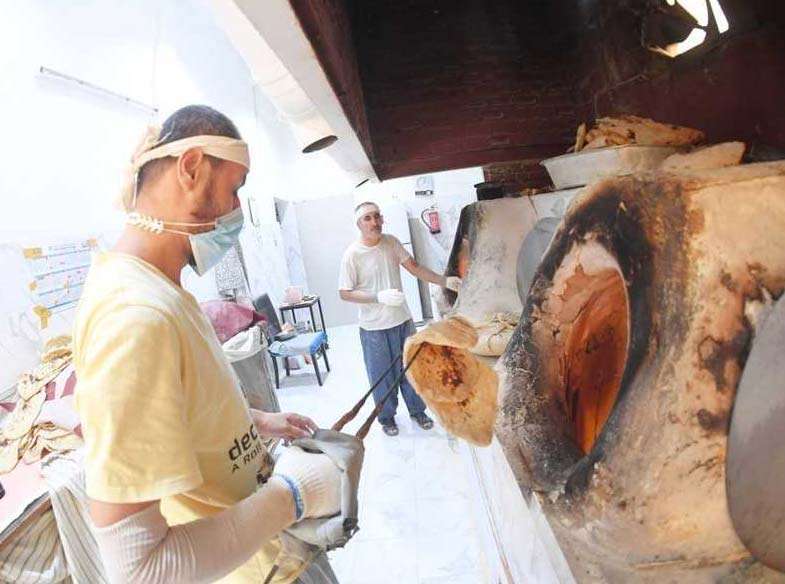Latest News
- To Address Regional Issues, Kuwait Joins The OIC Summit
- Streets, Services, And Infrastructure To Be Developed In Shuwaik...
- Passports Of Kuwaitis Involved In Drug Crimes Abroad Revoked By...
- Right To Privacy And Respect For The Dead
- Compatriots Scam Egyptians
- Mother And Daughter Arrested For Prostitution And Extortion
- Two Male Nurses Break Bones In A Fistfight
- Former Minister Arrested On Arrival Over Graft
- Ministry Of Education Uncovers Salary Payments To Absentees
- Kuwait Banks Seek Clarity From Central Bank On Citizenship Revoc...
- Kuwait Organizes 30 Events To Protect Children From Tobacco Indu...
- Proposal For Residential City South Of 6.5 Ring Road Rejected Ov...
The Availability Of Tannour Bread Is Rapidly Decreasing

Iranian bread, which is adored and favoured by many families, appears to be becoming scarce and may soon become a "food of the past." Numerous tannour bakeries have closed in many populous locations owing to a variety of factors, including excessive rents and the departure of many bakers and labourers who were skilled in tannour baking due to the Covid-19 epidemic or other factors.
Some Iranian bakers have found work in cooperative organizations and branches, while others have found work in fish and vegetable markets, restaurants, and other places. To add insult to injury, the Public Authority for Manpower increased residence fees for non-graduate expatriates 60 years and older to more than 800 dinars, including private health insurance, and the majority of tannour workers fell into this category of workers and had no choice but to leave for good.
With monthly rates in the investment zones ranging from 750 to a thousand dinars, many bakeries creating Iranian bread closed their doors, while a few lucky ones found work in cooperative societies' branches and bakeries' designated stores in the central marketplaces.
Despite the closure of nearly 40% of Iranian bread bakeries in the country's regions, the benefits offered by cooperative societies with the agreement of the Ministry of Social Affairs to Al-Tannour bakeries have helped to sustain this business near some coops.
According to Ehsan Muhammad, who runs Tannour Bakery in one of the cooperative societies, production in these bakeries is no longer restricted to one type of bread, which is Iranian bread in its traditional size and form. Instead, numerous bakeries have received clearance to produce a variety of baked goods.
In addition to the brown kind made with barley, Muhammad went on to state that the Iranian bread coated with sesame seed blended with flavorings such as "cocoa, honey, cheese, cream" is one of the new goods. "During Ramadan, the demand for Iranian bread soars, and production peaks in the afternoon and until the Maghreb call for prayer," Muhammad Shahid remarked. Every day, around a thousand loaves of bread, are manufactured.
He said that the reason for keeping the price of bread at 20 fils is because bakeries receive subsidized grain and petrol from the government, thus the expenses are reasonable when compared to the monthly earnings.
Despite the removal of tannour bakeries from investment zones, their numbers have risen to over 65 in cooperative organizations and their branches. Another advantage is that the workers are given work permits and free health insurance, as well as subsidized gas to run the ovens.
Mishaal Al-Manea, the chairman of the Consumer Protection Association, told the newspaper that cooperative societies are eager to grant subsidies to tannour bakers in order to keep product prices from rising and to defend customers' rights.
Trending News
-
 Expat Residency Law Amended By Kuwait Ministerial...
20 April 2024
Expat Residency Law Amended By Kuwait Ministerial...
20 April 2024 -
 Ministry Announces Separate Time For Amnesty Seeke...
21 April 2024
Ministry Announces Separate Time For Amnesty Seeke...
21 April 2024 -
 The Ministry Connects With Violators Of Residency...
23 April 2024
The Ministry Connects With Violators Of Residency...
23 April 2024 -
 AstraZeneca Admits Covid Vaccine Can Cause Rare Si...
29 April 2024
AstraZeneca Admits Covid Vaccine Can Cause Rare Si...
29 April 2024 -
 Work Permits Will Be Issued For One Year Under The...
27 April 2024
Work Permits Will Be Issued For One Year Under The...
27 April 2024 -
 3 Expats Caught In Salmiya With 213 Bottles Of Loc...
23 April 2024
3 Expats Caught In Salmiya With 213 Bottles Of Loc...
23 April 2024 -
 Temperature Increases Cause Electricity Load Index...
21 April 2024
Temperature Increases Cause Electricity Load Index...
21 April 2024 -
 Al-Nuer Festival Celebrates Kuwaiti Agriculture Wi...
22 April 2024
Al-Nuer Festival Celebrates Kuwaiti Agriculture Wi...
22 April 2024 -
 Peak-time 'cut-offs' Raise Fears Of An Electricity...
22 April 2024
Peak-time 'cut-offs' Raise Fears Of An Electricity...
22 April 2024 -
 Road Trip From Kuwait To Bahrain Via Saudi: Travel...
22 April 2024
Road Trip From Kuwait To Bahrain Via Saudi: Travel...
22 April 2024












Comments Post Comment